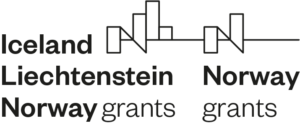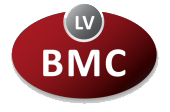
Project Title: Exploring the molecular mechanisms behind the effects of physical exercise on breast cancer prevention (CancerBeat)
Funding: EEA and Norway Grants 2014-2021
Project No EEA-RESEARCH-164
Period:01.05.2021-30.04.2024
Project promoter: Latvian Biomedical Research and Study Centre
![]()
Partners: Oslo University Hospital; National Institute of Chemical Physics and Biophysics, Estonia; National Cancer Institute, Lithuania; Latvian Academy of Sport Education

Project Costs: EUR 1 030 000.00
Principle Investigator: Dr. Bio. Aija Linē
Project aim (summary): It is well known that physical activity can prevent cancer development, but the molecular mechanisms behind these effects are poorly understood. During exercise, extracellular vesicles (EVs) are released into the circulation and mediate tissue crosstalk with potential effects on tumour cells and the immune tumour microenvironment. The overall aim of CancerBeat is to characterise the molecular cargo of exercise-induced EVs and explore their effects on breast cancer (BC) progression in vitro and in vivo.
Expected results of the project: It is planned to prepare 8 scientific publications, to present the results at 9 international conferences during the project.
More information on EEA and Norwegian grants is available at: www.norwaygrants.lv un www.eeagrants.lv.
Programme: Research and Education, Baltic research Programme
Information published 05.05.2021.
Progress of the project
1 May 2021 – 31 July 2021
The study protocol was approved by the Ethics committee of LASE and the enrolment of healthy female endurance runners has been started. Participants undertook an exercise protocol consisting of a submaximal physical fitness test at LASE Health Research in Sports lab and the blood samples were collected before and immediately after the exercise. Extracellular vesicles (EVs) were isolated from the blood samples at the BMC.
Information published 30.07.2021.
Progress of the project
1 August 2021 – 31 October 2021
The enrolment of healthy female long-distance runners has been completed. A total of 19 runners were involved. To assess the reproducibility, for 12 participants, sampling was repeated twice. Next, the EV preparations will be subjected to RNA sequencing and proteomics analyses and functional experiments in BC cell cultures at OUH and BMC. NCI has performed a pilot physical activity study in two mice strains, which will allow a large-scale study aiming to elucidate the effects of exercise-induced EVs on the immune tumour microenvironment and progression of metastatic cancer using a mouse model of breast cancer in a therapeutic and prophylactic setting. NICPB has optimized breast cancer cell culture growth conditions in a serum-free medium to investigate the influence of exercise-induced EVs on energy metabolism.
Information published 29.10.2021.
Progress of the project
1 November 2021 – 31 January 2022
We have started to analyse the RNA content of EVs isolated from blood samples of healthy long-distance runners collected before and immediately after the run. Preliminary results revealed a number of differentially expressed genes both between pre-run and post-run samples and between pre-run samples of runners and physically inactive controls. The differences between pre-run and post-run samples reflect the acute reaction to physical exercise, whereas the differences between the runners and controls reflect the long-term adaptation to exercise. Currently, we are studying the differentially expressed genes in order to identify the cell types that produce EVs during the exercise and to get an insight into the molecular processes triggered by the exercise.
Information published 31.01.2022.
Progress of the project
1 February 2022 – 30 April 2022
The clinical study protocol has been approved by CMĒK and the recruitment of breast cancer patients has been started. We invite stage II-III breast cancer patients to whom neoadjuvant chemotherapy has been prescribed to participate in this study. Based on the physical capacity measurements, a personalised training program is designed for each participant and we encourage the patients to carry out the program for the whole duration of the chemotherapy. The pre- and post-exercise blood samples will be collected twice during the study – before the onset of chemotherapy and after the final course of chemotherapy. EVs are isolated from the blood samples and next they will be subjected to the analysis of their RNA and protein cargo as well as for studying the functional effects they elicit in breast cancer cells.
Information published 29.04.2022.
Progress of the project
1 May 2022 – 31 July 2022
Recruitment of breast cancer patients is continued. The first patients have already completed the training program and the second set of blood samples is collected from these patients. We have isolated EVs from the blood samples and started to study their molecular content. Furthermore, we have started to study the effects of exercise-induced EVs on the transcriptome of breast cancer cells. The first results of this project were presented at FEBS3+ meeting in Tallinn.
Information published 29.07.2022.
Progress of the project
1 Augusts 2022 – 31 October 2022
Recruitment of breast cancer patients is continued. The second blood sample and tumour tissue specimens are collected from patients, who have completed the NAC and undergone the surgery. EVs were isolated from the blood samples and the analysis of their molecular cargo is carried out. Primary cell cultures are being established from the tissue specimens and, next, will be used for studying the effects of exercise-induced EVs. The results of the project were presented at the 1st meeting of the Baltic Society of Extracellular Vesicles in Tartu.
Information published 31.10.2022.
Progress of the project
1 November 2022 – 31 January 2023
We are still recruiting new patients in the study. From the surgical tissue specimens, primary cancer cell and fibroblast cultures were established and currently the effects of exercise-induced EVs on the physiological functions of these cells are being tested. RNA sequencing of pre-run and post-run EVs from healthy controls was completed and currently we are analysing the obtained data. EV samples have been sent to project partners for further proteomic analysis and studying their effects on cancer cell metabolism.
Information published 31.01.2023.
Progress of the project
1 February 2023 – 30 April 2023
We are still recruiting new patients in the study. We are currently testing the effects of exercise-induced EVs on the previously established primary cancer cell and fibroblast cultures. Total RNA was extracted from the tumour and normal tissue specimens and next it will be used for the RNA sequencing analysis. We made several attempts to start single-cell RNA sequencing experiments, however so far we have not obtained a tissue specimen with a sufficient number of cells. We completed the RNA-seq data analysis of the MCF7 cells treated with the Pre-Run and Post-Run EVs.
The results were presented at the Baltic Society for Extracellular Vesicles meeting in Vilnius, 28-29. April.
Information published 02.05.2023.
Progress of the project
1 May 2022 – 31 July 2022
Recruitment of new patients is now completed, whereas the exercise programs and sample collection from previously enrolled patients are continued. Testing the effects of exercise-induced EVs on the previously established primary cancer cell and fibroblast cultures is ongoing. We also continue to extract total RNA from the tumour and normal tissue specimens and next it will be used for the RNA sequencing analysis. We are still planning to start single-cell RNA sequencing experiments, however so far we have not obtained a tissue specimen with a sufficient number of cells.
Information published 01.08.2023.
Progress of the project
1 Augusts 2023 – 31 October 2023
The training program and the collection of clinical samples from the patients enrolled in this study are approaching the end and we are summarising the results of the clinical study. We continue to study the molecular content of exercise-induced EVs as well as their effects on the proliferation of cancer cells. Samples of EVs have been sent to the project partners to study their protein cargo and the effects on the energy metabolism of cancer cells.
Information published 31.10.2023.
Progress of the project
1 November 2023 – 31 January 2024
Recruitment of breast cancer patients into the study and collection of clinical samples is now completed. A major part of the experiments is now finished: the gene expression profiling of tumour tissues is completed, the effects of exercise-induced EVs on the proliferation of cancer cells have been tested and a single cell RNA sequencing experiment of EV-treated BC tissues has been performed. Currently, we are working on summarising and analysing the results and preparation of manuscripts.
Information published 31.01.2024.
Progress of the project
1 February 2024 – 30 April 2024
The study is completed! Results showed that regular physical exercise significantly improves response to the neoadjuvant chemotherapy. RNA sequencing analysis of tumour tissues revealed exercise-induced alterations in the tumour-intrinsic and immune-mediated signalling pathways that may be related to the favourable outcome. Interrogation of molecular cargo of EVs gave an insight into the tissue-specificity of EVs released during the exercise. Functional studies of EVs, however, gave controversial results as there were large inter-individual variations in the effects triggered by plasma EVs and gaining a deeper understanding of these effects would require further studies. In total, 8 scientific publications were prepared within this project and results were presented at numerous local and international conferences.
Information published 30.04.2024.

